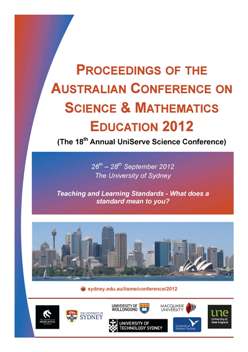Leading change beyond your classroom – Capacity building in SoTL and leadership by SaMnet
Abstract
The issue: The introduction of quality standards can place delegates to the ACSME conference in the forefront of reflection on, and changes to, teaching in their school, faculty, and university. How do you make the transition from being someone who experiments and implements strategies to teach more effectively into someone who leads colleagues in doing so? Furthermore, what support can you gain in that process, both support from within your institution, as you work to help others to satisfy externally imposed standards, as well as outside your university? Approach: Development of the capability of academic staff in science and mathematics to lead change is a chief aim of the ALTC/OLT project developing the Science and Mathematics network of Australian university educators – SaMnet. We have engaged more than 100 university staff (‘SaMnet Scholars’) across 19 institutions in teams of four to pursue action-learning projects. SaMnet are supporting these teams with guidance in the scholarship of teaching and learning and in providing insight into leading organisational change. SaMnet also provides mentoring and contact with other academics who share an interest in the area of a particular project, e.g., standards, inquiry learning, or new ICTs. The effort is meant to change an individual innovation in teaching into a formally recorded experiment. A well documented experiment can not only be published; it can provide data sufficient to convince colleagues, heads of school, deans, and others that the innovation addresses their key performance indicators, such as those that result from national quality standards. This approach builds on an uneven foundation: (1) the growth in SoTL in universities; (2) a history of initiatives to improve teaching in science and mathematics that is recognised has having left little widespread impact; and (3) literature on the nature of change in organisations, in general, and on change in universities, in particular. The first set of SaMnet’s action-learning projects is approaching a mid-point, and the projects have another year to run. The ACSME conference provides an opportune moment to reflect and gain additional perspectives on the strategies being pursued. Progress: Work in progress - initial. Key questions: 1. How might insights into organisational change be relevant to your efforts in your university, particularly in relation to coming standards? 2. What do you feel that you could learn from SaMnet Scholars at this session about tailoring your efforts to gain support from your head of school and dean? 3. What are we missing? What could a national network of science and mathematics academics do for you that we might not have thought of? 4. What aspects of leading change would you like to learn about – steps and transitions in change processes (Kotter and Bridges), aspects of a new idea that spur adoption (Rogers), or surface issues and underlying issues that need to be addressed (Wilber)?Downloads
Published
2012-08-29
Issue
Section
Ideas Exchange
